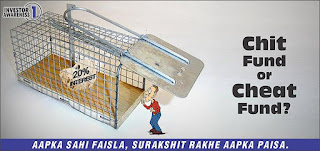30
sec
 |
| Current Affairs Article |
Dear Readers,
Welcome to Mentor for Bank Exams. Here I am
presenting Article on “RBI’s Sachet” a
portal launched to curb the illegal collection of money by companies. In
this article I tried to cover all the important points regarding the portal. This
article helps you in the preparation of various competitive exams.
The Reserve Bank
of India (RBI) launched a portal to curb illegal collection of money by companies.
Initiating
quick follow up and taking cases to logical conclusion by punishing the guilty
is paramount to deter entities in future from carrying out unlawful activity.
‘Sachet’ would help regulators in doing this as much as it would help members
of public in depositing their hard earned money with genuine entities by giving
them timely information about these entities.
Dr. Raghuram G.
Rajan, Governor, Reserve Bank of India stated this while launching ‘Sachet’
(lpsr) – a website from which the members of public would be able to obtain
information regarding entities that are allowed to accept deposits, lodge
complaints and also share information regarding illegal acceptance of deposits
by unscrupulous entities. The website would also help enhance coordination
among regulators and State Government agencies and thus be useful in curbing instances
of unauthorised acceptance of deposits by unscrupulous entities. The Governor
also acknowledged the role of U. K. Sinha, Chairman, SEBI and State Chief
Secretaries in revitalising SLCCs.
The URL of the
website is www.sachet.rbi.org.in
Explaining the
features of the website, Deputy Governor S. S. Mundra stated that the members
of the public can on the website check whether or not a particular entity
seeking to accept public deposits is registered with any regulator and whether
the entity is permitted to accept deposits. The website also incorporates
regulations prescribed by all financial regulators that different entities have
to follow. Further, members of public can file and track a complaint on this
website if any entity has illegally accepted money from them and/or defaulted
in repayment of deposits. They can also share information regarding any such
entity on this portal.
The website
also has a section for closed user group for SLCCs on which they would be able
to share market intelligence and other information relating to their activities,
including agenda and minutes of their meetings, across the country on a real
time basis. Mundra hoped that the website will act as a “force multiplier” and
go a long way in making the functioning of SLCCs more effective and curbing the
menace of unauthorised money raising activities.
S. Raman, Whole
Time Member of SEBI was present at the launch. Raman lauded the effort of
launching the website and stated that it would play a useful role in adding
preventive and educative elements to fight against unscrupulous entities
accepting public deposits. Other regulators, such as IRDA representatives of
State Governments participated in the launch event through video conference.
The Chief Secretaries of the States, who joined the launch through video
conference, welcomed the step and stated that it would play the useful role in ensuring
inter-agency coordination. A small video walkthrough of the website was shown
during the launch to highlight the main features of the website.
Background
SLCCs comprise various regulators, namely, Reserve Bank of India (RBI),
Securities and Exchange Board of India (SEBI), National Housing Bank (NHB), Insurance
Regulatory and Development Authority (IRDA), Registrar of Companies (ROC) and
concerned State Government departments, such as, Home Department, Finance
Department, Law Department and various Police Authorities. SLCCs were
reconstituted in 2014 in each State to monitor unauthorised collection of
deposits and they meet more frequently under the chairmanship of Chief
Secretaries/Administrators of the concerned States/Union Territories (UTs) with
participation of senior level officials of the States and the regulators. SLCCs
meet frequently with the top officials from all these agencies participating to
share information about the entities which are involved in unauthorised
acceptance of deposits and initiate action against them in a timely manner.




